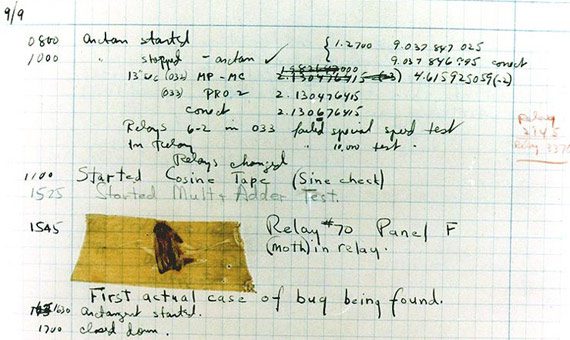Bugs in the Machine
Supporting staff and students to achieve their full potential since 1968.
Welcome to our weekly CENMAC blog post.
Bugs in the machine by Mary Long, CENMAC Advisory Teacher
In the computing world, an interesting story exists about the origins of the term ‘bug’ and ‘debugging’ … Back in 1947, the Mark II computer at Harvard University (USA) broke down and upon inspection, engineers saw that a moth had entered the machine, perhaps attracted by the light and heat. This short-lived little creature had shorted out relay number 70 of Panel F in its search for warmth. The technicians recorded the incident in their notebook by attaching the moth with sticky tape and writing:
“First actual case of bug found.”

Image © 1947 computer bug
Over the years, this story has become a popular explanation of why computer programmers use the word ‘bug’ to talk about errors. However, that episode was not actually the one that coined the term ‘bug’ for computer errors. The truth is that, well before this incident, these words were often used to refer to the malfunctions of machines, as evidenced by the notes of the inventor Thomas Edison in the 1870s. Some sources attribute the term to Edison himself.
The moth incident of 1947 did make the terms ‘bug’ and ‘debugging’ much more widely used and put the language into general use. The person responsible for this was Grace Hopper (nee Murray), a mathematician born in New York in 1906, an Admiral in the US Navy and a pioneer of information technology.

Grace Murray Hopper at the UNIVAC keyboard, c. 1960. Grace Brewster Murray: American mathematician and rear admiral in the U.S. Navy who was a pioneer in developing computer technology, helping to devise UNIVAC I. the first commercial electronic computer, and naval applications for COBOL (common-business-oriented language).
Credit: Unknown (Smithsonian Institution)
Hopefully, there are no bugs lurking anywhere within the equipment loaned out by CENMAC, but should you find that there are any technical issues with devices being used by students, our wonderful technician James is on hand to provide advice and support. Remember to contact your CENMAC link or call the office straightaway, if there are any problems.
Moving on to more bugs of the real-life variety, next week (22-28 June) is National Insect Week, and there are a number of ways that technology can help with developing an interest in the bugs that can be easily found out and about. If you have safe access to a garden, park or woodland, you can use apps such as Insect Identification (iOS) or Insect Identifier (Android) to go on a bug search and learn all about the insects in your location. These apps are free to download but offer in-app purchases and ‘Pro’ versions with more content.

If butterflies appeal to you, why not make use of technology to join in with the Big Butterfly Count this summer? There is a free app to download, along with a handy chart, to help identify and record the butterflies that you spot within a fifteen-minute period at any time between 17 July and 9 August. To find out more about how to take part, have a look at the video here.
A century ago, there were eight different species of oil beetle known to be living in Britain, but now three of those are thought to be extinct.
 Not quite as pretty looking, but still vital to ecosystems in the UK, is the oil beetle. A century ago, there were eight different species of oil beetle known to be living in Britain, but now three of those are thought to be extinct. To help preserve their habitats and stop these creatures from disappearing completely, Buglife (aka The Invertebrate Conservation Trust) need help with recording any sightings of them in your area. The best time to spot them is between March and June each year, so if you happen to find one, take a photo and submit your findings here.
Not quite as pretty looking, but still vital to ecosystems in the UK, is the oil beetle. A century ago, there were eight different species of oil beetle known to be living in Britain, but now three of those are thought to be extinct. To help preserve their habitats and stop these creatures from disappearing completely, Buglife (aka The Invertebrate Conservation Trust) need help with recording any sightings of them in your area. The best time to spot them is between March and June each year, so if you happen to find one, take a photo and submit your findings here.
Happy Bug Hunting!
Don’t forget you can share your CENMAC experiences for our CENMAC family to enjoy.
#AssistiveTechnology #Education #Mainstream #SEN #Homeschooling #CENMAC #Technology #Support #Solutions #Bugs #GraceMurrayHopper



